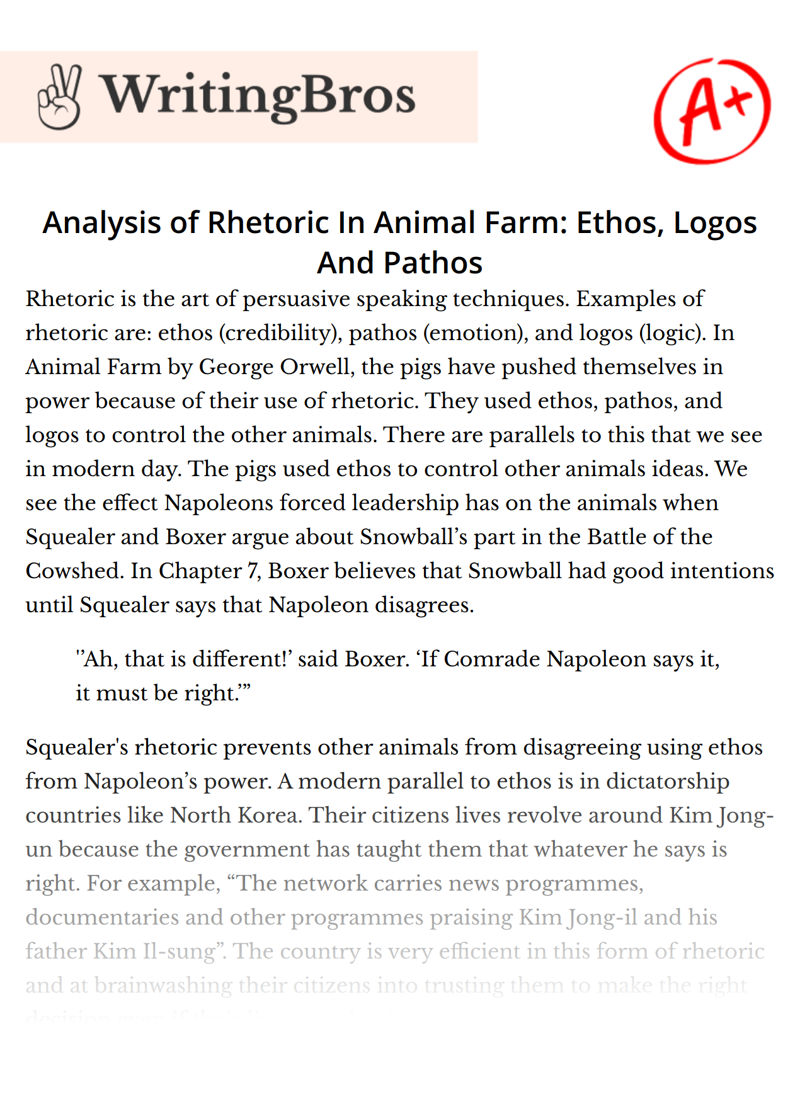Analysis of Rhetoric In Animal Farm: Ethos, Logos And Pathos

Rhetoric is the art of persuasive speaking techniques. Examples of rhetoric are: ethos (credibility), pathos (emotion), and logos (logic). In Animal Farm by George Orwell, the pigs have pushed themselves in power because of their use of rhetoric. They used ethos, pathos, and logos to control the other animals. There are parallels to this that we see in modern day.
The pigs used ethos to control other animals ideas. We see the effect Napoleons forced leadership has on the animals when Squealer and Boxer argue about Snowball’s part in the Battle of the Cowshed. In Chapter 7, Boxer believes that Snowball had good intentions until Squealer says that Napoleon disagrees.
'’Ah, that is different!’ said Boxer. ‘If Comrade Napoleon says it, it must be right.’”
Squealer's rhetoric prevents other animals from disagreeing using ethos from Napoleon’s power. A modern parallel to ethos is in dictatorship countries like North Korea. Their citizens lives revolve around Kim Jong-un because the government has taught them that whatever he says is right. For example, “The network carries news programmes, documentaries and other programmes praising Kim Jong-il and his father Kim Il-sung”. The country is very efficient in this form of rhetoric and at brainwashing their citizens into trusting them to make the right decision even if their lives may be difficult.
The pigs also used pathos to make the animals do more work. Napoleon frightens the other animals by slaughtering the ones that did not agree with him. As a result, Boxer says,
“It must be due to some fault in ourselves. The solution, as I see it, is to work harder. From now onwards I shall get up a full hour earlier in the morning".
The pigs used rhetoric by scaring the other animals into wanting to do the “right” thing and work harder. A modern example of pathos is when presidents use humor to relate to their audiences. Using this approach is a way to level with the public and earn their support. For example President Obama spoke about border security by stating, 'They said we needed to triple the border patrol, well now they're gonna say we need to quadruple the border patrol. Or they'll want a higher fence. Maybe they'll need a moat. Maybe they want alligators in the moat!' (npr.org). This form of rhetoric is very effective because not only does this method lighten the situation but it also allows him to address a heavy topic and point at holes in the other side’s argument.
Logos is used to trick the animals into thinking that the pigs are doing nothing wrong.
“You did not suppose, surely, that there was ever a ruling against beds? A bed merely means a place to sleep in. A pile of straw in a stall is a bed, properly regarded. The rule was against sheets, which are a human invention. We have removed the sheets from the farmhouse beds, and sleep between blankets”.
The pigs used rhetoric to persuade the other animals that it’s ok for them to sleep in beds. Stating what the commandments say is just enough logic to silence the other animals. A modern parallel to this form of rhetoric is the argument about the use of single use plastic bags. For example, many places like Kenya, France, and China have banned them in an effort to prevent things like pollution and marine life death. This is a logical decision especially when 100,000 marine animals die each year from the plastic. However, there are also reasons not to ban plastic bags. These reasons include the fact that banning them would get many workers laid off and that it would cost shoppers more money due to the cost of reusable bags.
Rhetoric is the art of persuasive speaking techniques. Examples of rhetoric are: ethos (credibility), pathos (emotion), and logos (logic). In Animal Farm by George Orwell, the pigs have pushed themselves in power because of their use of rhetoric. They used ethos, pathos, and logos to control the other animals. There are parallels to this that we see in modern day.
Using rhetoric is a very effective way to persuade someone. There are many forms of it, however the most common are ethos, pathos, and logos. In Animal Farm by George Orwell, the pigs are very powerful because of their use of rhetoric. They used ethos, pathos, and logos to control the other animals. There are many parallels to this that we can see in modern day.
References
- Orwell, G. (1945). Animal Farm. Secker and Warburg.
- Kinneavy, J. L. (1980). A theory of discourse: The aims of discourse. Waveland Press.
- Hill, C. J. (2006). The rhetoric of animal rights. Journal of Applied Communication Research, 34(2), 179-197.
- Rowley, J. (2006). Rhetoric and politics in George Orwell's Animal Farm. English Studies, 87(6), 720-735.
- Sexton, C. (2012). A rhetorical reading of George Orwell's Animal Farm. Cogent Arts & Humanities, 1(1), 7107.
Cite this Essay
To export a reference to this article please select a referencing style below

